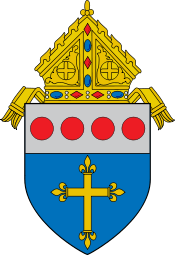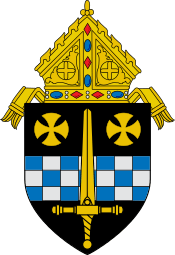John Wright (bishop of Pittsburgh)
| His Eminence John Joseph Wright | |
|---|---|
| Prefect of the Congregation for the Clergy | |
| See | Pittsburgh (emeritus) |
| Installed | April 23, 1969 |
| Term ended | August 10, 1979 |
| Predecessor | Jean-Marie Villot |
| Successor | Silvio Oddi |
| Other posts |
Bishop of Pittsburgh (1959-69) Bishop of Worcester (1950-59) |
| Orders | |
| Ordination | December 8, 1935 |
| Consecration | May 10, 1947 |
| Created Cardinal | April 28, 1969 |
| Personal details | |
| Born |
July 18, 1909 Dorchester, Massachusetts |
| Died |
August 10, 1979 (aged 70) Cambridge, Massachusetts |
| Coat of arms |
 |
| Styles of John Joseph Wright | |
|---|---|
 | |
| Reference style | His Eminence |
| Spoken style | Your Eminence |
| Informal style | Cardinal |
| See | Pittsburgh (emeritus) |
John Joseph Wright (July 18, 1909 – August 10, 1979) was an American cardinal of the Roman Catholic Church. He served as Prefect of the Congregation for the Clergy from 1969 until his death, and was elevated to the cardinalate in 1969.
Biography
Early life and ordination
John Joseph Wright was born in Dorchester, Massachusetts, to John and Harriet (née Cokely) Wright. While attending Boston Latin School, he worked at the Hyde Park branch of the Boston Public Library as stack boy in the evenings and summers. Wright graduated from Boston College in 1931, and then entered St. John's Seminary in Brighton. At the end of his first year at St. John's, he was sent to Rome to study at the Pontifical North American College and the Pontifical Gregorian University. He was ordained to the priesthood by Cardinal Francesco Marchetti Selvaggiani on December 8, 1935 in the chapel of the North American College.
Professor
After his ordination he did graduate work at the Gregorian, earning his Licentiate of Sacred Theology in 1936 and his Doctorate of Sacred Theology in 1939. Wright taught philosophy and theology at his alma mater of St. John's Seminary until 1943, when he was appointed private secretary to the Cardinal Archbishop of Boston, William Henry O'Connell. Wright continued in this position under O'Connell's successor, Cardinal Richard Cushing, and was raised to the rank of Monsignor on December 17, 1944.
Auxiliary bishop of Boston
On May 10, 1947, he was appointed Auxiliary Bishop of Boston and Titular Bishop of Aegeae. Wright received his episcopal consecration on the following June 30 from Archbishop Cushing, with Bishops Ralph Hayes and James Connelly serving as co-consecrators, in the Cathedral of the Holy Cross. Wright was later named the first Bishop of Worcester on January 28, 1950. In this position, he criticized both Utopians and doom-sayers, and said that an exemplary Christian "[recognizes] the vast errors of which human nature is capable...but [knows] that grace is stronger than sin".[1]
Bishop of Pittsburgh
Wright became the eighth Bishop of Pittsburgh on January 23, 1959, and then attended the Second Vatican Council (1962–65), during which he was a decisive force behind several of its documents.[2] Following the Council's advancements in ecumenism, he believed that an "immediate unity in good works and charity" would arise between Catholics and Protestants.[3]
Congregation for the Clergy
Pope Paul VI appointed Wright as the Prefect of the Congregation for the Clergy, and thus the highest-ranking American in the Roman Curia, on April 23, 1969.
Cardinal
He was created Cardinal Priest of Gesù Divin Maestro alla Pineta Sacchetti by Pope Paul in the consistory of April 28, 1969. Wright was one of the four cardinals who travelled to Auschwitz in 1972 for a memorial of Maximilian Kolbe; besides John Krol, he was the only other American cardinal to visit Poland.[4]
Wright did not participate in the August 1978 conclave because he was recovering from surgery,[5] but he was one of the cardinal electors in the conclave of the following October, which selected Pope John Paul II.
Views
He was an intellectual who was liberal on social issues, but conservative in theology.[6] He espoused civil rights and condemned the Vietnam War, but opposed ordination of women and birth control. He believed that annual Synods of Bishops would be useless and burdenful,[7] and that seven years was the appropriate age for children to receive the Sacrament of Penance, as it might be thus able to correct sinful behavior at an early age.[8] He also believed that Pope John Paul I would be "a witty Pontiff who delights in combining love of literature with love of the words of God."[9]
Wright died from polymyositis in Cambridge, Massachusetts, at age 70.[6] He is buried in Holyhood Cemetery in Brookline, Massachusetts.
References
- ↑ TIME Magazine. Substitute for Pollyanna September 28, 1953
- ↑ TIME Magazine. Princely Promotions April 4, 1969
- ↑ TIME Magazine. How Vatican II Turned the Church Toward the World December 17, 1965
- ↑ TIME Magazine. Pilgrim in Poland October 30, 1972
- ↑ TIME Magazine. In Search of a Pope August 21, 1978
- 1 2 TIME Magazine. Milestones August 20, 1979
- ↑ TIME Magazine. Reformists in Command October 31, 1969
- ↑ TIME Magazine. When to Confess September 3, 1973
- ↑ TIME Magazine. Compassionate Shepherd September 4, 1978
Sources
- Glenn, Francis A. (1993). Shepherds of the Faith 1843-1993: A Brief History of the Bishops of the Catholic Diocese of Pittsburgh. Pittsburgh: Catholic Diocese of Pittsburgh. ISBN none.
External links
| Catholic Church titles | ||
|---|---|---|
| Preceded by none |
Bishop of Worcester 1950–1959 |
Succeeded by Bernard Flanagan |
| Preceded by John Dearden |
Bishop of Pittsburgh 1959–1969 |
Succeeded by Vincent Leonard |
| Preceded by Jean-Marie Villot |
Prefect of the Congregation for the Clergy 1969–1979 |
Succeeded by Silvio Oddi |

